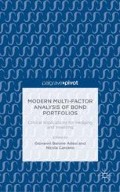Abstract
Several papers which tested alternative ways of hedging against yield curve risk reported that models capturing the dynamics of the yield curve better do not necessarily lead to better hedging. We claim that the main reason for these counterintuitive observations could have been the level of exposure to the model errors and tested a generalized model of PCA-hedging which controls the overall exposure to these errors. The results we obtained both for bond-based and for swap-based hedging clearly confirm our claim. Controlling the exposure to model errors leads to an average reduction in the hedging errors of 35%. An additional, important advantage of controlling the exposure to model errors is a substantial reduction in the transaction fees implied by the hedging strategies.
Access this chapter
Tax calculation will be finalised at checkout
Purchases are for personal use only
Preview
Unable to display preview. Download preview PDF.
Editor information
Editors and Affiliations
Copyright information
© 2016 Nicola Carcano
About this chapter
Cite this chapter
Carcano, N. (2016). Adjusting Principal Component Analysis for Model Errors. In: Adesi, G.B., Carcano, N. (eds) Modern Multi-Factor Analysis of Bond Portfolios: Critical Implications for Hedging and Investing. Palgrave Macmillan, London. https://doi.org/10.1007/978-1-137-56486-3_2
Download citation
DOI: https://doi.org/10.1007/978-1-137-56486-3_2
Publisher Name: Palgrave Macmillan, London
Print ISBN: 978-1-349-85024-2
Online ISBN: 978-1-137-56486-3
eBook Packages: Economics and FinanceEconomics and Finance (R0)

